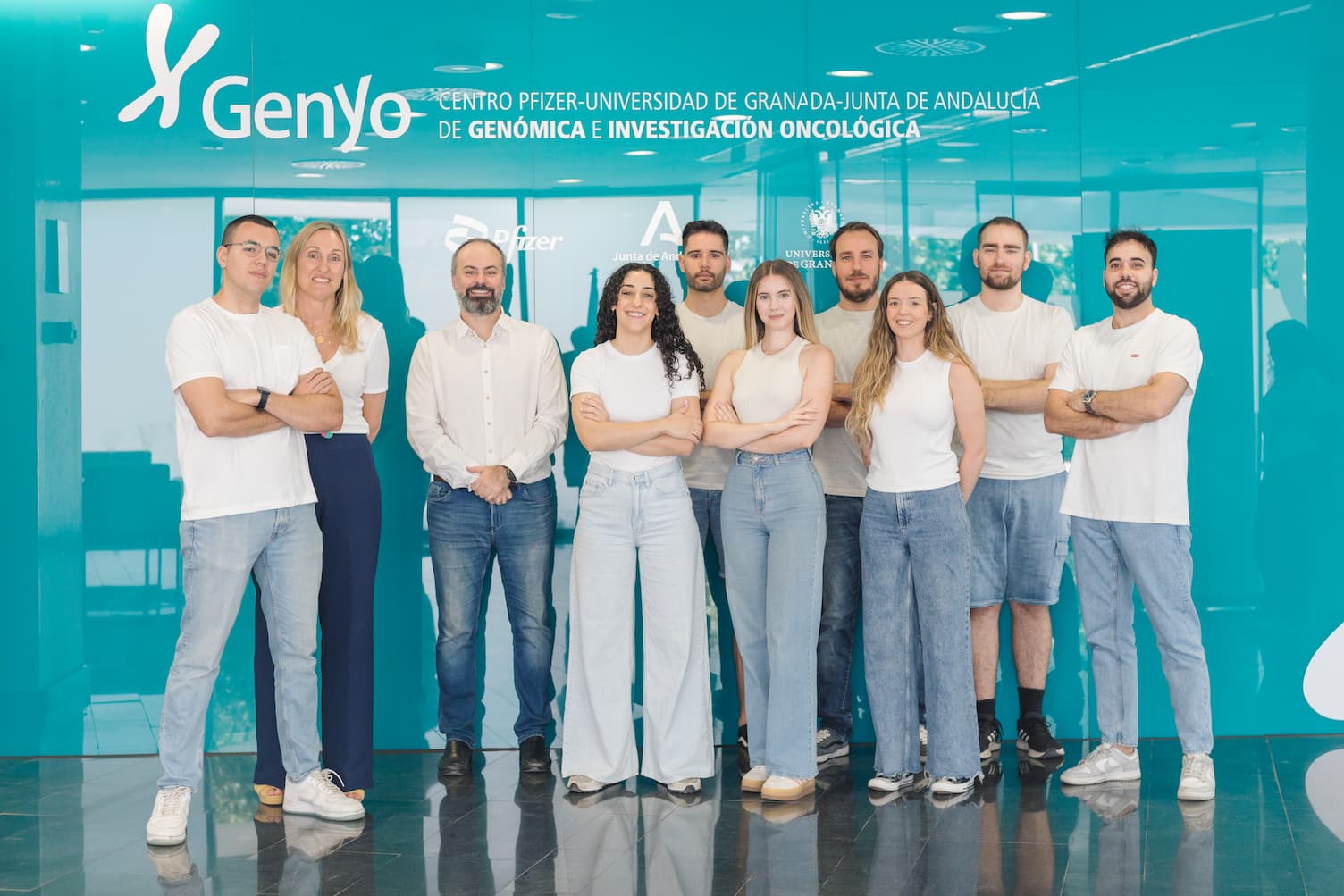PKP1 promotes lung cancer by modulating energy metabolism through stabilization of PFKP.
Autores: Ritoré-Salazar F, Arenas AM, Matia-González AM, Zaza A, Thomsen EA, Rovsing AB, Mikkelsen JG, Noguera NI, Medina PP
09/2025 - Biomarker research
No se ha encontrado investigadores para este término.
El proceso de regulación genética contribuye a aumentar la versatilidad funcional de la célula y su adaptación a las condiciones ambientales cambiantes generando proteínas cuando son necesarias. Se trata, por tanto, de uno de los procesos más importantes y complejos de la biología.
Actualmente se sabe que los cambios en la expresión génica son claves en la transformación tumoral mediante una mayor expresión de genes que favorecen el desarrollo de la carcinogénesis (oncogenes) y una disminución de la expresión de genes que la dificultan (supresores tumorales).

Inicio - Área de Genómica Funcional - Línea Estratégica 2: Genómica del Cáncer - Regulación de la expresión genética en cáncer
El proceso de regulación genética contribuye a aumentar la versatilidad funcional de la célula y su adaptación a las condiciones ambientales cambiantes generando proteínas cuando son necesarias. Se trata, por tanto, de uno de los procesos más importantes y complejos de la biología. Actualmente se sabe que los cambios en la expresión génica son claves en la transformación tumoral mediante una mayor expresión de genes que favorecen el desarrollo de la carcinogénesis (oncogenes) y una disminución de la expresión de genes que la dificultan (supresores tumorales). Los genes no codificantes de proteínas y la estructura de la cromatina desempeñan un papel importante en la regulación genética y los defectos en su función contribuyen al desarrollo de patologías humanas, incluido el cáncer. Ambos elementos regulatorios han sido el foco de los estudios de este grupo de investigación, especialmente en el contexto del cáncer.
Nuestros esfuerzos se centran en las siguientes líneas de investigación:
El complejo SWI/SNF es un complejo remodelador de la cromatina que utiliza la energía de la hidrólisis del ATP para modificar la estructura de la cromatina y contribuir a regular la expresión genética. Los avances recientes en el estudio de genes alterados en el desarrollo tumoral encuentran que el complejo SWI/SNF está funcionalmente inactivado mediante mutaciones en algunas de sus subunidades constituyentes. Así, se han encontrado frecuentes mutaciones de sus subunidades (SMARCA4, SMARCB1, ARID1A, ARID1B, PBRM1, BCL7A, etc.) en diferentes tumores. Nuestro laboratorio está contribuyendo a estos avances estudiando el papel del complejo SWI/SNF en diferentes cánceres, incluidos el cáncer de pulmón y los linfomas
Los avances recientes en genómica han puesto de relieve la importante funcionalidad de los llamados ARN no codificantes de proteínas. Estos elementos de ARN no codifican proteínas, pero se ha descubierto que algunos de ellos desarrollan funciones clave en patologías, incluido el cáncer. Nuestro laboratorio está contribuyendo a estos avances estudiando el papel de los ARN no codificantes de proteínas en diferentes cánceres, incluidos el cáncer de pulmón, los linfomas y las leucemias.
Nuestro laboratorio está comprometido con el desarrollo de estudios que tengan impacto tanto científico como social. Durante los últimos años hemos obtenido resultados que ayudaron a una mejor comprensión de la biología molecular del cáncer y fueron publicados en revistas de muy alto impacto (decil 1) entre ellas Molecular Cancer (IF=42), Blood (IF=25), Leucemia (IF = 12), etc. Es importante destacar que estos resultados no solo ayudaron a avanzar en la ciencia básica, sino que también lograron resultados traslacionales que dieron lugar a 3 patentes (P202030634, P202031253, P202430192) destinadas a mejorar el diagnóstico pronóstico y la terapia de varios tipos de tumores.

Autores: Ritoré-Salazar F, Arenas AM, Matia-González AM, Zaza A, Thomsen EA, Rovsing AB, Mikkelsen JG, Noguera NI, Medina PP
09/2025 - Biomarker research
Autores: Álvarez-Pérez JC, Sanjuán-Hidalgo J, Arenas AM, Hernández-Navas I, Benitez-Cantos MS, Andrades A, Calabuig-Fariñas S, Jantus-Lewintre E, Paz-Ares L, Ferrer I, Medina PP
09/2025 - Nature communications
Autores: Salagre D, Sanjuán-Hidalgo J, Elmahallawy EK, Medina PP, Agil A
07/2025 - Frontiers in pharmacology
Autores: Benitez-Cantos MS, Cano C, Cuadros M, Medina PP
02/2024 - Molecular cancer
Autores: Esposito R, Lanzós A, Uroda T, Ramnarayanan S, Büchi I, Polidori T, Guillen-Ramirez H, Mihaljevic A, Merlin BM, Mela L, Zoni E, Hovhannisyan L, McCluggage F, Medo M, Basile G, Meise DF, Zwyssig S, Wenger C, Schwarz K, Vancura A, Bosch-Guiteras N, Andrades Á, Tham AM, Roemmele M, Medina PP, Ochsenbein AF, Riether C, Kruithof-de Julio M, Zimmer Y, Medová M, Stroka D, Fox A, Johnson R
09/2023 - Nature communications
Autores: Castro-Gonzalez S, Cuadros M, Medina PP
06/2023 - Translational lung cancer research
Autores: Arenas AM, Ruiz-Jiménez JM, López-Hidalgo JL, Sanjuán-Hidalgo J, Medina PP
09/2023 - The Journal of pathology
Autores: Esposito R, Lanzós A, Uroda T, Ramnarayanan S, Büchi I, Polidori T, Guillen-Ramirez H, Mihaljevic A, Merlin BM, Mela L, Zoni E, Hovhannisyan L, McCluggage F, Medo M, Basile G, Meise DF, Zwyssig S, Wenger C, Schwarz K, Vancura A, Bosch-Guiteras N, Andrades Á, Tham AM, Roemmele M, Medina PP, Ochsenbein AF, Riether C, Kruithof-de Julio M, Zimmer Y, Medová M, Stroka D, Fox A, Johnson R
06/2023 - Nature communications
Autores: Patiño-Mercau JR, Baliñas-Gavira C, Andrades A, Benitez-Cantos MS, Rot AE, Rodriguez MI, Álvarez-Pérez JC, Cuadros M, Medina PP
03/2023 - Biomarker research
Autores: Andrades A, Peinado P, Alvarez-Perez JC, Sanjuan-Hidalgo J, García DJ, Arenas AM, Matia-González AM, Medina PP
02/2023 - Molecular cancer
Autores: Esposito R, Polidori T, Meise DF, Pulido-Quetglas C, Chouvardas P, Forster S, Schaerer P, Kobel A, Schlatter J, Kerkhof E, Roemmele M, Rice ES, Zhu L, Lanzós A, Guillen-Ramirez HA, Basile G, Carrozzo I, Vancura A, Ullrich S, Andrades A, Harvey D, Medina PP, Ma PC, Haefliger S, Wang X, Martinez I, Ochsenbein AF, Riether C, Johnson R
08/2022 - Cell genomics
Autores: Gallardo A, Molina A, Asenjo HG, Lopez-Onieva L, Martorell-Marugán J, Espinosa-Martinez M, Griñan-Lison C, Alvarez-Perez JC, Cara FE, Navarro-Marchal SA, Carmona-Sáez P, Medina PP, Marchal JA, Granados-Principal S, Sánchez-Pozo A, Landeira D
07/2022 - Oncogene
Autores: Peinado P, Andrades A, Cuadros M, Rodriguez MI, Coira IF, Garcia DJ, Benitez-Cantos MS, Cano C, Zarzuela E, Muñoz J, Loidi C, Saiz M, Medina PP
03/2022 - Clinical epigenetics
Autores: Boyero L, Martin-Padron J, Fárez-Vidal ME, Rodriguez MI, Andrades Á, Peinado P, Arenas AM, Ritoré-Salazar F, Alvarez-Perez JC, Cuadros M, Medina PP
04/2022 - Cellular oncology (Dordrecht, Netherlands)
Autores: Andrades A, Álvarez-Pérez JC, Patiño-Mercau JR, Cuadros M, Baliñas-Gavira C, Medina PP
04/2022 - Blood
Autores: Haswell JR, Mattioli K, Gerhardinger C, Maass PG, Foster DJ, Peinado P, Wang X, Medina PP, Rinn JL, Slack FJ
11/2021 - PloS one
Autores: Romero OA, Vilarrubi A, Alburquerque-Bejar JJ, Gomez A, Andrades A, Trastulli D, Pros E, Setien F, Verdura S, Farré L, Martín-Tejera JF, Llabata P, Oaknin A, Saigi M, Piulats JM, Matias-Guiu X, Medina PP, Vidal A, Villanueva A, Sanchez-Cespedes M
07/2021 - Nature communications
Autores: Peinado P, Andrades A, Martorell-Marugán J, Haswell JR, Slack FJ, Carmona-Sáez P, Medina PP
11/2021 - Human molecular genetics
Autores: Cuadros M, García DJ, Andrades A, Arenas AM, Coira IF, Baliñas-Gavira C, Peinado P, Rodríguez MI, Álvarez-Pérez JC, Ruiz-Cabello F, Camós M, Jiménez-Velasco A, Medina PP
12/2020 - Cancers
Autores: Peinado P, Andrades A, Cuadros M, Rodriguez MI, Coira IF, Garcia DJ, Álvarez-Perez JC, Baliñas-Gavira C, Arenas AM, Patiño-Mercau JR, Sanjuan-Hidalgo J, Romero OA, Montuenga LM, Carretero J, Sanchez-Cespedes M, Medina PP
12/2020 - Cancers
Autores: Arenas AM, Cuadros M, Andrades A, García DJ, Coira IF, Rodríguez MI, Baliñas-Gavira C, Peinado P, Álvarez-Pérez JC, Medina PP
07/2020 - Cancers
Autores: Baliñas-Gavira C, Rodríguez MI, Andrades A, Cuadros M, Álvarez-Pérez JC, Álvarez-Prado ÁF, de Yébenes VG, Sánchez-Hernández S, Fernández-Vigo E, Muñoz J, Martín F, Ramiro AR, Martínez-Climent JA, Medina PP
10/2020 - Leukemia
Autores: Conde-Muiño R, Cano C, Sánchez-Martín V, Herrera-Merchan A, Comino A, Medina PP, Palma P, Cuadros M
03/2020 - Oncotarget
Autores: Martin-Padron J, Boyero L, Rodriguez MI, Andrades A, Díaz-Cano I, Peinado P, Baliñas-Gavira C, Alvarez-Perez JC, Coira IF, Fárez-Vidal ME, Medina PP
08/2020 - Oncogene
Autores: Martin-Padron J, Boyero L, Rodriguez MI, Andrades A, Díaz-Cano I, Peinado P, Baliñas-Gavira C, Alvarez-Perez JC, Coira IF, Fárez-Vidal ME, Medina PP
08/2020 - Oncogene
Autores: Galindo I, Gómez-Morales M, Díaz-Cano I, Andrades Á, Caba-Molina M, Miranda-León MT, Medina PP, Martín-Padron J, Fárez-Vidal ME
02/2020 - Upsala journal of medical sciences
Autores: Cuadros M, Andrades Á, Coira IF, Baliñas C, Rodríguez MI, Álvarez-Pérez JC, Peinado P, Arenas AM, García DJ, Jiménez P, Camós M, Jiménez-Velasco A, Medina PP
11/2019 - Blood cancer journal
Autores: Cuadros M, Sánchez-Martín V, Herrera-Merchan A, Baliñas C, Martín-Padrón J, Boyero L, Peinado P, Medina PP
11/2019 - Clinical & translational oncology : official publication of the Federation of Spanish Oncology Societies and of the National Cancer Institute of Mexico
Autores: Cuadros M, Sánchez-Martín V, Herrera-Merchan A, Baliñas C, Martín-Padrón J, Boyero L, Peinado P, Medina PP
11/2019 - Clinical & translational oncology : official publication of the Federation of Spanish Oncology Societies and of the National Cancer Institute of Mexico
Autores: Conde-Muiño R, Cano C, Sánchez-Martín V, Herrera A, Comino A, Medina PP, Palma P, Cuadros M
07/2017 - Oncotarget
Autores: Herrera-Merchan A, Cuadros M, Rodriguez MI, Rodriguez S, Torres R, Estecio M, Coira IF, Loidi C, Saiz M, Carmona-Saez P, Medina PP
10/2017 - Oncotarget
Autores: Cuadros M, Sánchez-Martín V, Herrera A, Baliñas C, Martín-Padrón J, Boyero L, Peinado P, Medina PP
08/2017 - Clinical & translational oncology : official publication of the Federation of Spanish Oncology Societies and of the National Cancer Institute of Mexico
Autores: Pérez-Jiménez A, Rufino-Palomares EE, Fernández-Gallego N, Ortuño-Costela MC, Reyes-Zurita FJ, Peragón J, García-Salguero L, Mokhtari K, Medina PP, Lupiáñez JA
11/2016 - Phytomedicine : international journal of phytotherapy and phytopharmacology
Autores: Reyes-Zurita FJ, Rufino-Palomares EE, García-Salguero L, Peragón J, Medina PP, Parra A, Cascante M, Lupiáñez JA
01/2016 - PloS one
Autores: Mokhtari K, Rufino-Palomares EE, Pérez-Jiménez A, Reyes-Zurita FJ, Figuera C, García-Salguero L, Medina PP, Peragón J, Lupiáñez JA
01/2015 - Evidence-based complementary and alternative medicine : eCAM
Autores: Schiaffino-Ortega S, Balinas C, Cuadros M, Medina PP
11/2014 - Journal of hematology & oncology
Autores: Coira IF, Rufino-Palomares EE, Romero OA, Peinado P, Metheetrairut C, Boyero-Corral L, Carretero J, Farez-Vidal E, Cuadros M, Reyes-Zurita FJ, Lupiáñez JA, Sánchez-Cespedes M, Slack FJ, Medina PP
03/2015 - Human molecular genetics
Autores: Muñoz-Lopez M, Medina PP, Garcia-Perez JL
10/2013 - Cancer cell
Autores: Reyes-Zurita FJ, Rufino-Palomares EE, Medina PP, Leticia García-Salguero E, Peragón J, Cascante M, Lupiáñez JA
11/2013 - Biochimie
Autores: Rufino-Palomares EE, Reyes-Zurita FJ, García-Salguero L, Mokhtari K, Medina PP, Lupiáñez JA, Peragón J
05/2013 - Journal of proteomics
Autores: Chen PY, Qin L, Barnes C, Charisse K, Yi T, Zhang X, Ali R, Medina PP, Yu J, Slack FJ, Anderson DG, Kotelianski V, Wang F, Tellides G, Simons M
12/2012 - Cell reports
Autores: Medina PP, Nolde M, Slack FJ
09/2010 - Nature
Autores: Castillo SD, Angulo B, Suarez-Gauthier A, Melchor L, Medina PP, Sanchez-Verde L, Torres-Lanzas J, Pita G, Benitez J, Sanchez-Cespedes M
09/2010 - The Journal of pathology
Autores: Trang P, Medina PP, Wiggins JF, Ruffino L, Kelnar K, Omotola M, Homer R, Brown D, Bader AG, Weidhaas JB, Slack FJ
03/2010 - Oncogene
Autores: Medina PP, Castillo SD, Blanco S, Sanz-Garcia M, Largo C, Alvarez S, Yokota J, Gonzalez-Neira A, Benitez J, Clevers HC, Cigudosa JC, Lazo PA, Sanchez-Cespedes M
04/2009 - Human molecular genetics
Autores: Medina PP, Slack FJ
01/2009 - Nature methods
Autores: Medina PP, Slack FJ
08/2008 - Cell cycle (Georgetown, Tex.)
Autores: Medina PP, Sanchez-Cespedes M
03/2008 - Epigenetics
Autores: Medina PP, Romero OA, Kohno T, Montuenga LM, Pio R, Yokota J, Sanchez-Cespedes M
05/2008 - Human mutation
Autores: Angulo B, Suarez-Gauthier A, Lopez-Rios F, Medina PP, Conde E, Tang M, Soler G, Lopez-Encuentra A, Cigudosa JC, Sanchez-Cespedes M
02/2008 - The Journal of pathology
Autores: Carretero J, Medina PP, Blanco R, Smit L, Tang M, Roncador G, Maestre L, Conde E, Lopez-Rios F, Clevers HC, Sanchez-Cespedes M
03/2007 - Oncogene
Autores: Quintela-Fandino M, Hitt R, Medina PP, Gamarra S, Manso L, Cortes-Funes H, Sanchez-Cespedes M
09/2006 - Journal of clinical oncology : official journal of the American Society of Clinical Oncology
Autores: Medina PP, Carretero J, Ballestar E, Angulo B, Lopez-Rios F, Esteller M, Sanchez-Cespedes M
04/2005 - Human molecular genetics
Autores: Medina PP, Carretero J, Fraga MF, Esteller M, Sidransky D, Sanchez-Cespedes M
10/2004 - Genes, chromosomes & cancer
Autores: Fernandez P, Carretero J, Medina PP, Jimenez AI, Rodriguez-Perales S, Paz MF, Cigudosa JC, Esteller M, Lombardia L, Morente M, Sanchez-Verde L, Sotelo T, Sanchez-Cespedes M
06/2004 - Oncogene
Autores: Carretero J, Medina PP, Pio R, Montuenga LM, Sanchez-Cespedes M
05/2004 - Oncogene
Autores: Medina PP, Ahrendt SA, Pollan M, Fernandez P, Sidransky D, Sanchez-Cespedes M
08/2003 - Cancer epidemiology, biomarkers & prevention : a publication of the American Association for Cancer Research, cosponsored by the American Society of Preventive Oncology
Información general
Miembros
Proyectos
Publicaciones
Información general
Miembros
Proyectos
Publicaciones
Contenidos

Suscríbete a nuestro boletín de noticias
